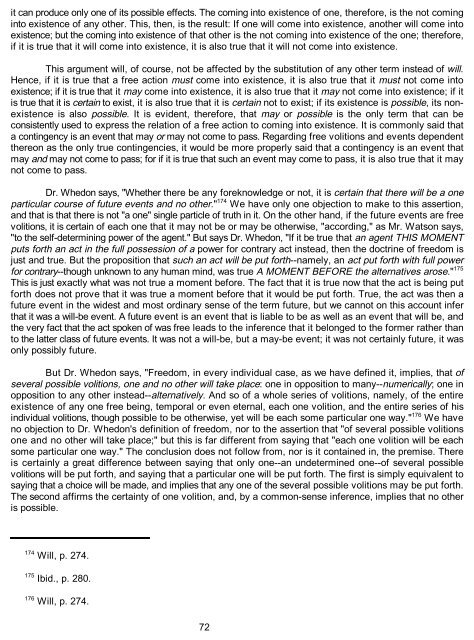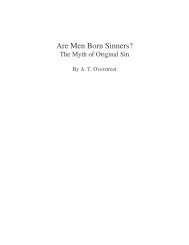Foreknowledge by Joel Hayes - Library of Theology
Foreknowledge by Joel Hayes - Library of Theology
Foreknowledge by Joel Hayes - Library of Theology
Create successful ePaper yourself
Turn your PDF publications into a flip-book with our unique Google optimized e-Paper software.
it can produce only one <strong>of</strong> its possible effects. The coming into existence <strong>of</strong> one, therefore, is the not coming<br />
into existence <strong>of</strong> any other. This, then, is the result: If one will come into existence, another will come into<br />
existence; but the coming into existence <strong>of</strong> that other is the not coming into existence <strong>of</strong> the one; therefore,<br />
if it is true that it will come into existence, it is also true that it will not come into existence.<br />
This argument will, <strong>of</strong> course, not be affected <strong>by</strong> the substitution <strong>of</strong> any other term instead <strong>of</strong> will.<br />
Hence, if it is true that a free action must come into existence, it is also true that it must not come into<br />
existence; if it is true that it may come into existence, it is also true that it may not come into existence; if it<br />
is true that it is certain to exist, it is also true that it is certain not to exist; if its existence is possible, its nonexistence<br />
is also possible. It is evident, therefore, that may or possible is the only term that can be<br />
consistently used to express the relation <strong>of</strong> a free action to coming into existence. It is commonly said that<br />
a contingency is an event that may or may not come to pass. Regarding free volitions and events dependent<br />
thereon as the only true contingencies, it would be more properly said that a contingency is an event that<br />
may and may not come to pass; for if it is true that such an event may come to pass, it is also true that it may<br />
not come to pass.<br />
Dr. Whedon says, "Whether there be any foreknowledge or not, it is certain that there will be a one<br />
174<br />
particular course <strong>of</strong> future events and no other." We have only one objection to make to this assertion,<br />
and that is that there is not "a one" single particle <strong>of</strong> truth in it. On the other hand, if the future events are free<br />
volitions, it is certain <strong>of</strong> each one that it may not be or may be otherwise, "according," as Mr. Watson says,<br />
"to the self-determining power <strong>of</strong> the agent." But says Dr. Whedon, "If it be true that an agent THIS MOMENT<br />
puts forth an act in the full possession <strong>of</strong> a power for contrary act instead, then the doctrine <strong>of</strong> freedom is<br />
just and true. But the proposition that such an act will be put forth--namely, an act put forth with full power<br />
for contrary--though unknown to any human mind, was true A MOMENT BEFORE the alternatives arose." 175<br />
This is just exactly what was not true a moment before. The fact that it is true now that the act is being put<br />
forth does not prove that it was true a moment before that it would be put forth. True, the act was then a<br />
future event in the widest and most ordinary sense <strong>of</strong> the term future, but we cannot on this account infer<br />
that it was a will-be event. A future event is an event that is liable to be as well as an event that will be, and<br />
the very fact that the act spoken <strong>of</strong> was free leads to the inference that it belonged to the former rather than<br />
to the latter class <strong>of</strong> future events. It was not a will-be, but a may-be event; it was not certainly future, it was<br />
only possibly future.<br />
But Dr. Whedon says, "Freedom, in every individual case, as we have defined it, implies, that <strong>of</strong><br />
several possible volitions, one and no other will take place: one in opposition to many--numerically; one in<br />
opposition to any other instead--alternatively. And so <strong>of</strong> a whole series <strong>of</strong> volitions, namely, <strong>of</strong> the entire<br />
existence <strong>of</strong> any one free being, temporal or even eternal, each one volition, and the entire series <strong>of</strong> his<br />
176<br />
individual volitions, though possible to be otherwise, yet will be each some particular one way." We have<br />
no objection to Dr. Whedon's definition <strong>of</strong> freedom, nor to the assertion that "<strong>of</strong> several possible volitions<br />
one and no other will take place;" but this is far different from saying that "each one volition will be each<br />
some particular one way." The conclusion does not follow from, nor is it contained in, the premise. There<br />
is certainly a great difference between saying that only one--an undetermined one--<strong>of</strong> several possible<br />
volitions will be put forth, and saying that a particular one will be put forth. The first is simply equivalent to<br />
saying that a choice will be made, and implies that any one <strong>of</strong> the several possible volitions may be put forth.<br />
The second affirms the certainty <strong>of</strong> one volition, and, <strong>by</strong> a common-sense inference, implies that no other<br />
is possible.<br />
174<br />
Will, p. 274.<br />
175<br />
176<br />
Ibid., p. 280.<br />
Will, p. 274.<br />
72






